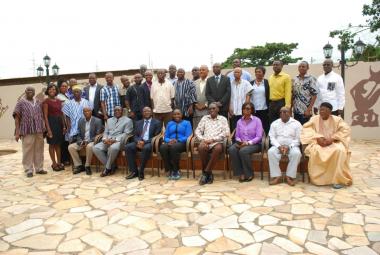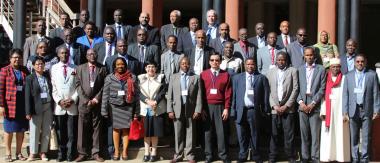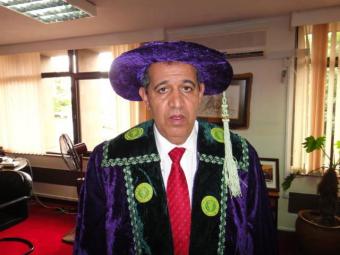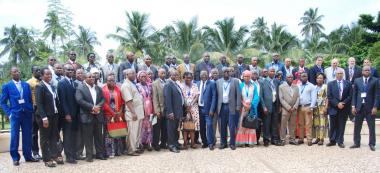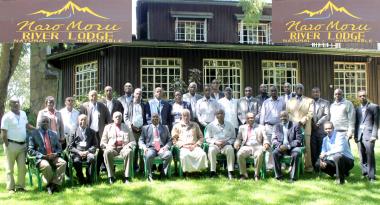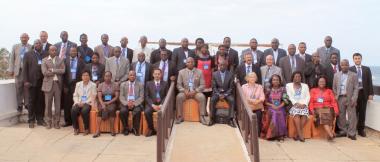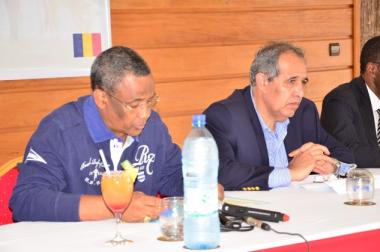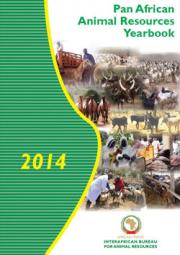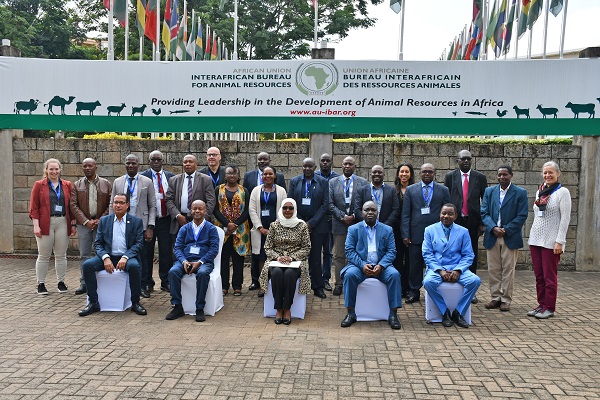
The development of pastoral markets in Africa is crucial for enhancing the livelihoods of millions of pastoral communities and driving economic growth across the continent. Recognizing this importance, AU-IBAR orchestrated a dynamic workshop from June 19-20, 2024, in Nairobi, Kenya. This significant gathering united representatives from Regional Economic Communities (COMESA, ECCAS, ECOWAS, IGAD), International Development Partners (EU, FAO, IFAD, USAID, Gates Foundation), International Financial Institutions (AfDB, WB), International Research Institutions (ILRI), and the Boston Consulting Group.
Under the theme “Harnessing Knowledge Sharing and Partnerships for Sustainable Pastoral Market Development and Sector Transformation,” the workshop aimed to revolutionize the pastoral sector across Africa. The event's core objective was to foster robust collaboration among regional and international stakeholders, enhancing the effectiveness and sustainability of the African Pastoral Markets Development (APMD) Platform. Participants engaged in knowledge sharing, policy environment assessments, and consensus-building on actionable strategies to support pastoral livestock marketing. This collaborative effort, held under the auspices of the Pastoral Market Development Platform and funded by the Bill and Melinda Gates Foundation, aimed to drive sector transformation and improve the livelihoods of pastoral communities across Africa.
Workshop Objectives and Importance
1. Knowledge Promotion: The workshop facilitated knowledge sharing on regional and international initiatives, identified gaps, and explored opportunities for improving pastoral livestock marketing. This is crucial for enhancing the efficiency and sustainability of pastoral markets.
2. Policy Environment Assessment: Evaluating the regional policy environment to support pastoral livestock marketing and sector transformation was a key focus. The assessment helps align policies with the needs of pastoral communities and donor strategies, ensuring a supportive framework for market development.
3. Consensus Building and Promoting Engagement: Building consensus and fostering engagement among development partners were vital for the sustainable implementation and impactful outcomes of the African Pastoral Markets Development (APMD) Platform. Collaboration among stakeholders is essential for coordinated efforts and resource mobilization.
Challenges and Strategic Interventions
The pastoral livestock sector faces several challenges, including gaps in policy enabling environments, lack of access to markets, and insufficient data sharing protocols. The workshop addressed these issues through workgroups focused on strengthening the data ecosystem, private sector integration, and policy coherence. These groups aim to formulate targeted strategies and policies to support pastoralists and enhance the sector's resilience and effectiveness.
Speech by AU-IBAR Director Dr. Huyam Salih
Dr. Huyam Salih, AU-IBAR Director, emphasized the strategic importance of the workshop in enhancing the effectiveness of the APMD Platform and solidifying partnerships. She stated:
"This workshop marks a significant milestone in our collective effort to transform the pastoral livestock sector across Africa. By harnessing knowledge sharing and fostering robust partnerships, we aim to catalyze actions and collaborations that are essential for the sustainable development of pastoral markets. The expertise and commitment of all participants are crucial in driving these efforts forward. Together, we can pave the way for a prosperous future for Africa’s pastoral communities. Our focus on meaningful exchanges, cooperative strategies, and actionable plans will undoubtedly lead to significant advancements in addressing the challenges and opportunities within pastoral markets. I look forward to the continued collaboration and the impactful outcomes that will arise from this workshop."
Presentations and Their Significance
Youssouf Kabore, Chief Livestock Officer, and Uzoamaka Joe-Nkamuke, Senior Agribusiness Officer at the African Development Bank, presented on the Feed Africa Strategy with a focus on the Livestock Investment Master Plan (LIVEMAP). This presentation highlighted the need for increased investments to drive technology-powered transformation in the livestock value chain. Key components include fostering sovereign investment, leveraging advanced technologies, and forming collaborative partnerships to scale impactful projects and catalyze private sector involvement. LIVEMAP guides the AfDB and Regional Member Countries in prioritizing investments aligned with continental and national priorities, supporting the broader objectives of the Feed Africa strategy.
Kiraye Michael from the African Leather and Leather Products Institute (ALLPI) discussed ALLPI’s mission to enhance the leather sector's value addition, sustainability, and competitiveness through knowledge sharing and innovation. ALLPI’s activities for 2024 involve partnerships with various stakeholders to strengthen industry clusters, connect markets, and promote sustainability. This presentation emphasized the need for strategic interventions to support the pastoral livestock sector and improve market access.
Koutou Mamadou from AU-SAFGRAD presented on the African Union Guidelines to Secure Pastoralism and Prevent Conflict in Africa. The guidelines support sustainable pastoralism aligned with environmental sustainability and economic development goals. Key points included securing pastoral resources, promoting balanced territorial development, managing risks like drought and conflict, and implementing effective monitoring and evaluation mechanisms. This framework aims to enhance pastoral development, mitigate risks, and foster peaceful coexistence in African pastoral communities.
Organic Goura SOULE, Technical Assistant for Livestock and Pastoralism at the ECOWAS Commission, highlighted ECOWAS’s strategies for establishing a predictable institutional and regulatory framework. Key actions include creating strategies for animal health and welfare, livestock identification and traceability, and control of transboundary animal diseases. These efforts aim to secure pastoral systems and enhance the sector's resilience.
The Jameel Observatory, represented by the University of Edinburgh and ILRI, focuses on food security issues in East African drylands. The partnership aims to prepare vulnerable pastoral and agro-pastoral communities for environmental shocks and stresses. The research for action program addresses periodic food and nutritional security shocks, applying data and knowledge to support affected communities and increase their resilience.
Joseph Njuguna from FAO Kenya and Paul Mutungi from FAO RTEA presented on the co-management model of livestock marketing in Kenya. This model integrates local livestock marketing associations with local governments for joint management, enhancing market infrastructure, operational efficiency, and disease control. The co-managed markets ensure better revenue sharing, security, and conflict resolution, ultimately benefiting pastoral communities.
Conclusion
The workshop underscored the importance of knowledge sharing, strategic partnerships, and policy coherence in transforming pastoral markets. The presentations provided valuable insights into various initiatives and strategies aimed at enhancing the pastoral livestock sector's sustainability and resilience. By fostering collaboration among stakeholders, the APMD Platform aims to create thriving economic hubs driven by innovation and equitable growth, ultimately improving the livelihoods of Africa’s pastoral communities.

